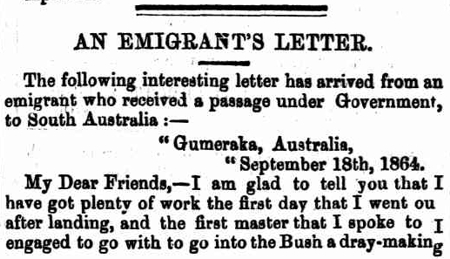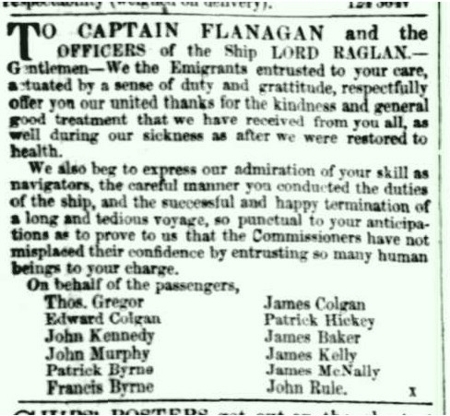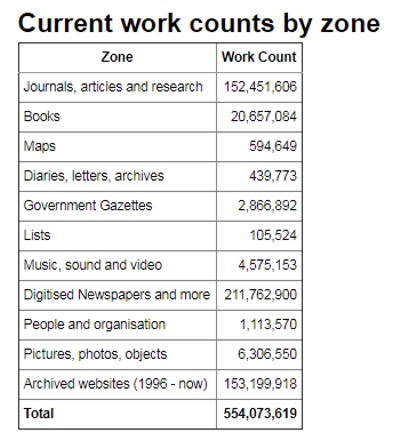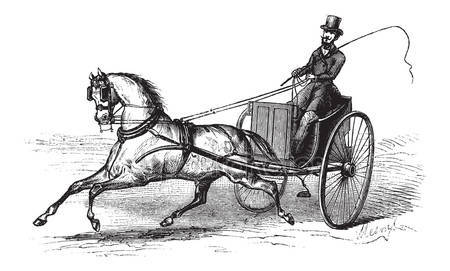A Thankyou to the Captain
As an avid Trovite, I love reading the old newspapers (as so many of us do). And yet, I am still amazed at the very cool stuff you can find in the old newspapers.
Take for instance one of my recent finds. A friend asked me to see what I could find on the “Lord Raglan” 1854 voyage to South Australia.
So after some general Googling to find out the basic details (the ship left Plymouth, Devon 16 July 1854, and arrived in Port Adelaide, South Australia on 23 October 1854), I found a copy of the original passenger list on the State Library of South Australia website. I also found references to it on the Passengers in History site, and The Ships List.
Anyway so then I headed off to Trove , and I came up with a thankyou message that the passengers had written to the Captain of the Lord Raglan ship, and they put it publicly in the the newspaper. How cool is that?
It’s great to know that Captain Flanagan and his crew looked after their passengers on the long voyage to a new life.
Another newspaper entry I found relating to the Lord Raglan, quotes the following …
The fine new ship Lord Raglan, 923 tons register, Captain Flanagan, for Adelaide, and the Appoline, of 500 tons, for Melbourne, having embarked their respective complements of emigrants from the Government dept, at Plymouth, sailed on Sunday. The Lord Raglan belongs to Messrs. W. Nicholson and Sons, of Sunderland, and has been fitted up on a most excellent plan, the result of the experience of Captain Lean, R.N., the Government emigration officer in London. Among other advantages, one-third of each bed can be turned up from the sides of the ship, so as to admit of a free passage two feet wide, all round her, and thus secure an effectual means of cleansing and ventilating the vessel every day. Her emigrants, numbering 369 souls, were under the charge of Surgeon Superintendent W. Brett.
This was from the South Australian Register, 21 October 1854, pg. 2.
Note: Trovite = a person who loves hanging out on the Trove website.
Trove – Eight Years of Incredible Discoveries
Eight years ago, the way of historical and genealogical research in Australia changed forever. Trove went live.
Created by the National Library of Australia, the Trove website is a portal to their absolutely incredible collection of records.
By “absolutely incredible”, I’m talking millions of records. But not “just” millions. How about 554,000,000 of them? That’s right, over HALF A BILLION of them in fact! All online and all free to search. So how lucky are we?
There’s no doubt that Trove is Australia’s number 1 website for research. If it’s not yours, it should be! So go and bookmark it www.trove.nla.gov.au now.
If you’re not familiar with Trove, take a quick look at the videos below that give you a quick overview, of what it is, and the different facets to it.
So you’ll find photos, journals and articles, archived websites, government gazettes, music, sound and video recordings, diaries and letters, maps and books, even vintage issues of the Women’s Weekly magazine. They all make up the phenomenal collection of Australian history that the National Library of Australian (NLA) looks after. For more a detailed analysis on using Trove and all it’s facets, check out Shauna Hicks’ “Trove: Discover Genealogy Treasure in the National Library of Australia“.
However what most researchers (myself included) head to Trove for, is their historical newspaper collection. And why wouldn’t we, they are so fun. And with over 200 million pages of old newspaper online already – there are so many stories just waiting to be found.
The blog theme “Trove Tuesday” was started back in 2012 by Amy Houston of the Branches Leaves and Pollen blog, [note, I know the link has changed, but I still wanted to give her the credit], and through its creation, has inspired so many to find and share their amazing discoveries using Trove.
Just having a quick look through my own Trove Tuesday posts, and I’ve done articles on obituaries, the opening of a butter factory, drink ‘driving’, a hanging, a duel, several WW1 and WW2 related entries, local football match, Adelaide’s water supply, gold, South Australian pioneers, an earthquake, Christmas, the plague, a sudden death, a ploughing match … and so much more.
None of this would have been easily accessible without the online newspapers on Trove. The detail in a newspaper article is often better than you’ll find anywhere else , so it is a valuable source of information.
So I wish to say a huge CONGRATULATIONS to the National Library of Australia team for Trove’s 8th birthday, and THANKYOU, THANKYOU, THANKYOU for giving us the present of Trove.
And one last note, if you come across the following terms, here are their definitions:
– BT – before Trove
– pre-Trove – life before Trove
– post-Trove – life after Trove went live
– Troveite – a person addicted to searching Trove’s newspapers
and for even more Trove related lingo, be sure to check out a heap more at Carmel’s Library Currents blog
Related Articles:
13 Tips For Searching Trove’s Historical Newspapers
Hoon, and You’ll be Fined … Even in the 1840s
Same thing. Different century. And still boys will be boys! These days it’s reckless driving, back then it was reckless riding …
Furious riding and driving are daily witnessed in Sydney to the extreme annoyance and danger of all persons who may happen to be in the street. People, whether drunk or sober, seem equally careless of the consequence to be apprehended from such wanton conduct, and we often wonder that children and others are not more frequently rendered the objects of accidents; For the middle of the streets are seldom empty, and indeed the contempt of danger of those on foot seems quite equal to the absence of caution on the part of riders and drivers. On Monday a youth on horse-back rode at a quick rate, nearly at full speed, through the street, and knocked down a young girl, the mother of a child, with the child in her arms, and occasioned in her very serious injury. A complaint was made at the Police Office, and the offender was committed to the Sessions for the assault.
– The Australian Sydney, NSW, 14 February 1827, pg2
Back in the 1840s a law was passed in South Australia to fine those who were “furious riding or driving”. In otherwords, speeding or ‘hooning’ on your horse, as opposed to speeding or ‘hooning’ in a car as it is these days.
Furious Riding or Driving
By the provisions of the New Police Act, furious riding or driving is punishable by a fine of from Two to Ten pounds. It will be seen by our police report that a penalty of the lowest amount was enforced yesterday against a person for galloping in Hindley street. He pleaded ignorance of the Act (an excuse not likely long to be available), which was apparently the occasion of the lenity shewn to him.
– South Australian Register, 7 February 1845, pg3
“Dear Friends” … Letter From an Emigrant in 1864
So what was life like for those who emigrated to South Australia back in the 1800s? Generally you’re only likely to find this information from letters written to family or friends in the ‘old country’, or otherwise from diaries. So it was a surprise to find an article on Trove about an emigrant who not only came to South Australia, but actually settled in the tiny town of Gumeraka (note the alternate spelling of Gumeracha).
Written in 1864 to some friends in England (or maybe Wales), it was produced as an article the Scotts Circular (Newport, Wales), and then in The Adelaide Express, 22 April 1865 (as reproduced below). The writer details what it was like for him and his family with housing food, work and wages, neighbours and other businesses all getting a mention. What we don’t know is who the author of the letter is. Still, it makes for an interesting read.
In 1864 the town of Gumeracha was not very old, having only been laid out in the 1850s (for more on that click here).
The article starts off with “The following interesting letter has arrived from an emigrant who received a passage under Government, to South Australia.”——————————

An Emigrant’s Letter, Adelaide Express, 22 April 1865 http://nla.gov.au/nla.news-article207600900
The text below is a full transcript of the article. Note the paragraphs have been added in by me to make it easier to read.
AN EMIGRANT’S LETTER.
Gumeraka, Australia,
September 18th, 1864.
My Dear Friends, I am glad to tell you that I have got plenty of work the first day that I went on after landing, and the first master that I spoke to I engaged to go with to go into the Bush a dray-making and waggon-making at the wheelwrighting trade, at the rate of wages I will give you, and you can see whether it is as good as in England. I think there is a better chance for a working man to get on here; the wages that I am going to have is, with lodgings, that is a hut and firewood as much as I like to burn, and all my food, and I have meat every meal, and eggs and tea every meal, and pudding every day, and £1 10s. per week, if that is not; good send and let me know of it; that was the first chance that I had.
I think it as good as £2 10s per week, and my wife have a good many things gave her, and the children get plenty to eat at the farm which we live close to.
Our hut have got canvas windows instead of glass, but they do out here as there is not many people to see out here, only at the farm house. They keep a blacksmith’s shop and a wheelwright’s shop, but it is about a mile from the farm, and they send our meals down to us; there is another wheelwright that married the daughter which live at the farm; their house is like a cow-shed-in England, but they got plenty of money, they are Scotch people; and they are good people to work with, and my wife and children are quite well and myself in good health.
We can live as cheap as we could in England, and butter is 8d. per pound; beef, 2 1/2d. to 3d.; mutton, 2d. to 4d. per pound; sugar, 4d.; tea, 2s. 6d. to 3s.; bread now is rather dear Is. a gallon (?) ; beer, 10d. per quart and 1s.
There is plenty of work out here if people will but come out to try. If any body will come out I will go and meet them, and keep them till they can get work, or I will ‘try and see if I could get them a place, but there is nobody out of work here; cloth is about the same as in England.
Please to read this to all of the shop, and tell them that I am very much obliged to them for what they done for me when I were at home, but if I can do anything for any of them in any way, I will do it with the greatest pleasure of doing it to any of my old shopmates; please to tell them all to write to me, and I will write to them in return, and please to send me some newspapers, and I will send they some.—Scotts Circular, (Newport, Wales.)
So there you have it. That’s what life was like in Gumeracha back in 1864, and no doubt similar in other country towns, taken from a firsthand account.




![earliest known photo of Gumeracha, taken c1870 [click for a larger image]](http://www.lonetester.com/wp-content/uploads/2017/03/Earliest-photo-of-Gumeracha-1870s-300x179.jpg)



